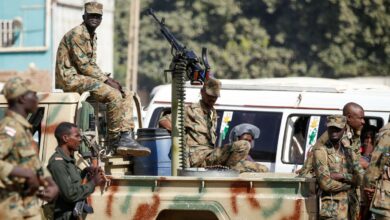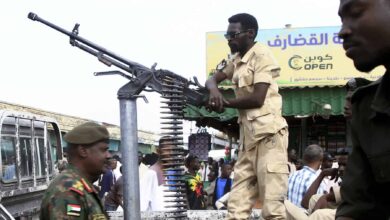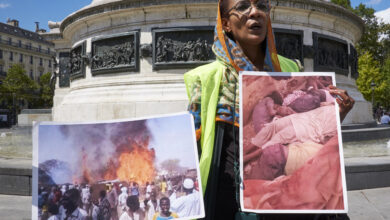A Sudanese war crimes suspect, part of the Islamist regime ousted in 2019, has escaped jail as heavy battles rocked the country Wednesday, heightening fears for a fragile ceasefire.
On the second full day of a three-day truce, witnesses reported “heavy air strikes” in East Nile, east of the capital, and “a huge explosion in the direction of a paramilitary camp.”
Warplanes flew over northern suburbs of Khartoum, drawing heavy anti-aircraft fire from the paramilitaries, witnesses told AFP.
In southern Khartoum, machinegun fire was reported near one of the homes owned by paramilitary commander Mohamed Hamdan Daglo, who has led the heavily armed Rapid Support Forces (RSF) into war against the armed forces, under army chief Abdel Fattah al-Burhan.
The army said Wednesday it would send a representative to Juba, capital of neighbouring South Sudan, for talks with the RSF “at the initiative of IGAD,” the East African regional bloc.
The talks will aim to “extend the truce by 72 hours,” the armed forces said, as the current one, which has been largely ignored, is due to end on Thursday evening.
In the chaos — which has killed hundreds, sparked an exodus, and deepened humanitarian suffering — Ahmed Harun, linked to deposed strongman Omar al-Bashir‘s regime, said Tuesday he and others had escaped prison.
Harun is wanted for war crimes by the International Criminal Court in connection with the Bashir regime’s unleashing of Janjaweed militias against non-Arab ethnic minorities in Darfur.
Beginning in 2003, that conflict left around 300,000 dead and 2.5 million displaced, according to the UN.
Daglo’s RSF are descended from the Janjaweed.
After being trapped in the empty Kober jail in “the crossfire of this current battle,” Harun said in a recorded TV address that he and fellow ex-regime members had taken “our protection in our own hands.”
The ICC prosecutor’s office said it was following developments but added there was no independent confirmation of the Kober detainees’ status.
‘The Deposed Regime’
Since fighting broke out on April 15, foreign governments from all corners of the globe have organized road convoys, aircraft and ships to get thousands of their people out of Sudan, while citizens have fled overland to neighbouring countries.
The UN said it has “received reports of tens of thousands of people arriving in the Central African Republic, Chad, Egypt, Ethiopia, and South Sudan.”
According to Bankole Adeoye, the African Union’s commissioner for political affairs, peace and security, continued fighting will increase the “risk of regional conflagration and internationalisation of the conflict.”
Bashir, 79, was ousted by the military in 2019 in the wake of mass pro-democracy protests.
He had himself been held in Kober prison.
But the army said Bashir and others had been transferred to a military hospital before fighting erupted “due to their health conditions,” and that they remained under judicial police guard.
The RSF claimed Wednesday that the war was “a cover” to “get the leaders of the deposed regime out of prison.”
The main civilian bloc ousted from power by Burhan and Daglo, the Forces of Freedom and Change (FFC), echoed the RSF position.
The FFC said the re-emergence of Harun was proof “the deposed regime and its dissolved party are — through their assets in the armed forces — behind the ongoing war.”
After Bashir’s ouster, which had raised hopes for a transition to democracy, Burhan and Daglo seized full power in a 2021 coup, but have now fallen out.
The fighting has killed at least 512 people and wounded more than 4,000, according to the health ministry, and reduced some districts of greater Khartoum to ruins.
The dead include two American civilians, US officials confirmed. One of them was a Sudanese-American doctor Bushra Ibnauf Sulieman of the University of Khartoum, according to a Washington, DC public relations firm.
More than 60 percent of health care facilities in Khartoum are closed because of the conflict, the World Health Organization said Wednesday.
A total of 14 hospitals have been shelled, the doctors’ union said, while 19 others are out of service.
The WHO also said it was assessing the threat posed to public health after fighters in Sudan occupied a national laboratory holding samples of deadly diseases.
The UN representative to Sudan, Volker Perthes, told the UN Security Council that “both of the warring parties have fought with disregard for the laws and norms of war.”
Perthes, who has stayed in Sudan, said they have been “attacking densely populated areas with little consideration for civilians, for hospitals, or even for vehicles transferring the wounded and sick.”
‘Hysterical State’
Alnour Mohammed Ahmed is one of those civilians.
“Why didn’t the officials care for the Sudanese people and their suffering?” asked Ahmed, a builder.
They are also suffering shortages of essential goods including food, medicines, and fuel.
In continued evacuations, a ship carrying more than 1,600 civilians from more than 50 countries docked in Saudi Arabia early Wednesday, and Britain airlifted nationals to Cyprus.
“We were in a hysterical state because we could no longer sleep or eat,” said Karima Rouifki, who was among 293 Moroccans who arrived in their country aboard two aircraft Wednesday.
Another Moroccan, Fatimia Zahra, said she had to flee when a factory beside her Khartoum home was bombed.
“We lost our home and possessions,” she said.
Despite violations, White House national security spokesman John Kirby told reporters on Wednesday that “violence has decreased.”
The ceasefire is to expire at 2200 GMT Thursday but Kirby said the US remains “in direct contact” with both generals, working with them “to see if we can get this ceasefire extended.”










